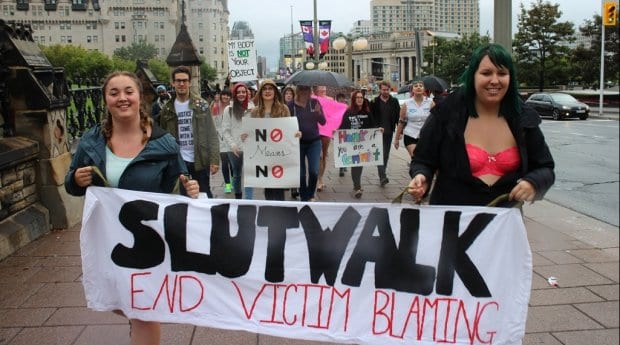People of all genders took to the streets in downtown Ottawa on Sept 13, 2015, to participate in SlutWalk Ottawa, protesting slut shaming and rape culture.
Organized locally this year by Kayla Spagnoli and Marley Ann Heather, SlutWalk is a global movement that began in Toronto that calls on people to challenge victim-blaming, oppression and sexual violence.
About 150 participants gathered at the Human Rights Monument for speeches and a rally before marching through the streets, past Parliament Hill as they carried signs and chanted.
RJ, a Saulteaux Cree activist who identifies as two-spirit, non-binary and uses the pronoun they, began their talk by acknowledging the march was taking place on unceded Algonquin territory.
Missing and murdered indigenous women — and the government’s inadequate response — are a constant reminder of the danger people face due to their gender and ethnicity, RJ said.
“It’s not unusual for me to see on my Facebook feed, every other week I feel like I’m seeing another missing indigenous woman who is just gone and then a couple of weeks later maybe we’ll see that they were murdered,” they said. “We are the original inhabitants of this country and I feel like not enough people understand that there are a lot of issues amongst these communities and the amount of people that are missing and the lack of support that we’re getting from the government.”
Debbie Owusu-Akyeeah, from the Carleton University Womyn’s Centre, also discussed intersectionality, and the way women of colour often internalize negative images about their race and sexuality.
“We participate in systematic violence when we choose to ignore that black and other racialized and indigenous women are hypersexualized and are more likely to be victims of sexual assault because of our race,” Owusu-Akyeeah said.
Body policing of black girls starts at a young age and being labeled as hypersexual means girls and women of colour often internalize negative messages about their race and sexuality, she said.
“Words and phrases like ‘fast’ or ‘too grown’ have been thrown onto our bodies because we’re racialized,” she said. “Being told that our bodies are too much and the ideal femininity is for white women.”
She added that as a black, queer woman, it takes a lot of effort to unlearn the messages perpetrated by racist, misogynistic body policing of women of colour.
“I’m here to say my blackness is resistance,” Owusu-Akyeeah said. “My feminism is resistance. It took me 23 years to stop associating femininity with sluttiness and also unlearning the bullshit . . . I’m proud to be here today to show off my belly, to show off my curves because I can.”
Sassy Harlot, a speaker from Prostitutes of Ottawa-Gatineau Work Educate and Resist, talked about how Canada’s recent sex-work legislation undermines sex workers’ safety.
“We face a lot of stigma and often can’t speak up using our real identities and showing our real faces,” Harlot said. “We risk losing our non-sex work-related jobs, our homes, our children and face a lot of police harassment.”
After the Bedford victory, the legislation that the Harper government passed was a huge setback, and is in opposition to the evidence sex workers provided that criminalizing clients makes sex workers unsafe, she said.
“No one should face arrest for consensual adult sex,” Harlot continued. “No one should stand in the way of our right to bodily autonomy, whether we’re using that [right] to say yes or to say no, or whether that decision is based on emotional or financial considerations.”
Before the rally, Paul Dewar, the NDP MP for Ottawa Centre, told Daily Xtra it was important for him to show his support as a male ally. From missing and murdered indigenous women to trans rights, gender plays a significant role in violence and oppression, he said.
“What I think is important about this initiative is that it’s grassroots and it was women saying we need to take back language and take back some of the things that have been used as weapons against women,” Dewar said. “Language is really important and also how people frame gender and sex, and [SlutWalk] is really a creative way of taking that on.”
Despite the rainy afternoon, marchers were in good spirits as they made their way through the downtown streets. After the march, Spagnoli told Daily Xtra that volunteers and donations make SlutWalk possible. Her twin sister Jenna added that anyone who missed SlutWalk but wants to attend a similar event should save the date for Take Back the Night. Hosted by Women’s Event Network, marchers will gather at Minto Park on Sept 24, 2015, at 6 pm.
Editor’s note: This is an extended version of a condensed piece that ran earlier.


 Why you can trust Xtra
Why you can trust Xtra


